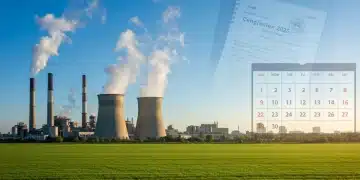Once energy policy discussion: what you need to know

Energy policy developments focus on increasing renewable energy use, leveraging technological innovations, fostering global cooperation, and engaging communities to combat climate change effectively.
Have you ever thought about how once energy policy discussion shapes our everyday lives? Exploring this topic uncovers essential insights into legislation that can influence everything from your energy bills to the environment. Let’s dive in!
Understanding current energy policy trends
Understanding current energy policy trends is essential for navigating today’s complex energy landscape. These trends shape everything from energy prices to environmental impacts. By keeping an eye on these developments, we can better appreciate how energy decisions affect our lives.
Recent Legislative Changes
One significant aspect of current trends is the shift in legislative focus. Governments worldwide are prioritizing sustainable energy solutions. This change encourages investments in renewable resources and cleaner technologies.
- Expansion of tax credits for renewable energy projects
- New regulations on carbon emissions
- Increased funding for energy efficiency programs
The push for cleaner energy policies aims to combat climate change while boosting local economies. Understanding the motivations behind these legislative changes can help us support effective policies.
Market Shifts
Alongside legislation, market dynamics play a crucial role in shaping energy policy. For instance, technological advancements are driving down the costs of renewable energy. As these resources become more affordable, more consumers opt for green energy options. This shift influences policy decisions as governments respond to market demands.
Additionally, public awareness is rising regarding energy consumption’s environmental impact. Citizens and organizations alike advocate for more robust policies to promote sustainability. This grassroots movement pushes policymakers to prioritize green initiatives, creating a cycle of advocacy and action.
The Role of International Agreements
International agreements also significantly influence energy policy trends. Initiatives like the Paris Agreement push countries to commit to reducing carbon emissions. This global perspective encourages nations to work together towards shared environmental goals.
- Collaborative efforts to lower greenhouse gas emissions
- Sharing of best practices in energy efficiency
- Investment in cross-border renewable energy projects
In conclusion, understanding current energy policy trends means recognizing the interplay between legislation, market shifts, and international agreements. By staying informed, we can advocate for effective policies that benefit both our communities and the planet.
The impact of energy policies on local communities
The impact of energy policies on local communities can be profound. When governments enact new energy regulations or support specific energy sources, the effects can ripple throughout neighborhoods, economies, and the environment.
Economic Effects
Energy policies often influence local economies directly. For instance, when renewable energy projects are funded, they create jobs. This influx of jobs can boost local spending and improve quality of life.
- Creation of green jobs in solar and wind industries
- Local businesses benefiting from increased spending
- Development of infrastructure leading to better services
Conversely, stringent regulations on traditional energy sources can lead to job losses in sectors like coal or oil. Communities relying on these industries may face economic downturns as workers transition to new job markets.
Environmental Considerations
The environmental impacts of energy policies also affect local communities. Policies promoting cleaner energy sources can enhance air and water quality. Improved environmental conditions contribute to better health outcomes for residents.
When fossil fuels are phased out in favor of renewable options, pollution levels decrease significantly. This positive change helps to create healthier living environments, particularly in urban areas.
On the flip side, energy policies can sometimes lead to environmental degradation if not managed properly. For example, the construction of large wind farms or solar fields can alter local ecosystems. Therefore, careful planning and community involvement are essential to mitigate these impacts.
Community Engagement
Finally, the success of energy policies often hinges on community engagement. When residents are included in the policymaking process, it leads to more effective and accepted policies. Community meetings and public forums can encourage dialogue and help planners understand local needs.
- Residents voicing concerns and ideas for energy projects
- Collaborative efforts fostering trust between authorities and communities
- Input from local experts guiding sustainable practices
In summary, the impact of energy policies on local communities highlights the need for thoughtful, inclusive approaches. Engaging communities ensures that policies serve their best interests while promoting economic and environmental benefits.
How energy policy affects climate change

Understanding how energy policy affects climate change is crucial in today’s world. Energy decisions made by governments have wide-reaching impacts on greenhouse gas emissions and environmental sustainability.
Greenhouse Gas Emissions
Energy policies directly influence the levels of greenhouse gases released into the atmosphere. For instance, policies that promote clean energy sources can significantly reduce emissions. When governments invest in renewables like solar and wind power, they effectively lower our reliance on fossil fuels, which are major contributors to climate change.
- Increased use of renewable energy sources
- Regulations limiting emissions from power plants
- Encouragement of energy efficiency measures
Conversely, policies that fail to address fossil fuel dependence can exacerbate climate issues. Without strong regulations, emissions continue to rise, leading to more severe climate impacts.
Investment in Sustainable Technology
Another important aspect is the investment in sustainable technology driven by energy policies. When governments prioritize funding for clean technology, it fosters innovation. This technological advancement can lead to breakthroughs in reducing emissions and improving energy efficiency.
For example, electric vehicles (EVs) are a significant focus of modern energy policies. Encouraging the adoption of EVs decreases reliance on gasoline, thereby lowering overall emissions. These policies can not only curb climate change but also promote economic growth by creating new jobs in the clean technology sector.
International Cooperation
The role of international cooperation in energy policy also impacts climate change outcomes. Agreements like the Paris Agreement set targets for reducing emissions globally. When countries work together to enhance energy policies, it amplifies their effectiveness against climate change.
- Joint initiatives for renewable energy projects
- Sharing technology and best practices
- Commitments to meet specific emissions reduction targets
In summary, the relationship between energy policy and climate change is vital. By implementing effective policies, nations can mitigate climate impacts, promote sustainable economies, and foster international collaboration to address global challenges.
Key players in energy policy discussions
The discussion around energy policy involves various key players who influence decisions and outcomes. Understanding who these individuals and organizations are can help demystify the policy-making process.
Government Officials
Government officials play a critical role in shaping energy policies. They are responsible for creating, implementing, and enforcing regulations that guide energy use. These officials often come from various departments, including energy, environment, and finance.
- Legislators propose new laws regarding energy
- Regulators enforce compliance with energy standards
- Executive leaders set national energy priorities
The policies they develop can have far-reaching impacts on both local and global energy landscapes. Their decisions can spur innovation or slow down the transition to cleaner energy.
Industry Leaders
Industry leaders, including executives from energy companies, are also vital in shaping energy policy discussions. Their experiences and insights provide a practical perspective on the implications of various policies.
These leaders advocate for their companies while influencing regulations that govern their industries. Key players in the energy sector include:
- Renewable energy companies focusing on solar, wind, and hydro
- Traditional fossil fuel companies adapting to changing regulations
- Technology firms working on energy efficiency solutions
By collaborating with government officials, industry leaders can help create more effective and realistic energy policies that address both economic growth and sustainability.
Non-Governmental Organizations (NGOs)
Non-governmental organizations also contribute to energy policy discussions by representing public interests. NGOs often focus on environmental sustainability and advocate for policies that protect natural resources.
Through research and community engagement, these organizations bring data and grassroots insights into the policymaking process. Some roles they play include:
- Raising awareness about environmental issues
- Campaigning for renewable energy solutions
- Providing independent evaluations of energy policies
Their involvement can lead to a more balanced perspective in energy policy debates, ensuring that the voices of communities and the environment are heard.
Academic Institutions and Researchers
Academic institutions and researchers are crucial for analyzing energy policies and their impacts. They conduct studies that inform government and industry decision-making processes.
Through rigorous research, these experts provide insights into energy trends, potential impacts, and areas needing improvement. Their findings can highlight:
- The benefits of transitioning to renewable energy
- Potential economic impacts of various policies
- Long-term sustainability goals and challenges
By integrating research into policy discussions, academics help ensure that decisions are grounded in evidence and best practices.
Future forecasts for energy policy developments
Future forecasts for energy policy developments indicate significant changes on the horizon. These changes are driven by environmental concerns, technological advancements, and societal pressures. As the world shifts towards sustainability, energy policies will evolve to meet new challenges and goals.
Increased Focus on Renewable Energy
One major forecast is the growing emphasis on renewable energy sources. Countries are setting ambitious targets to reduce carbon emissions, which will lead to increased investments in solar, wind, and hydropower. This transition not only aims to decrease reliance on fossil fuels but also to create green jobs.
- Expansion of solar power installations
- Growth in offshore and onshore wind farms
- Advancements in battery storage technology
As these renewable technologies become more accessible, energy policies will likely reflect this shift, aiming to modernize the grid and improve infrastructure.
Technological Innovations
Technological innovations will play a critical role in shaping future energy policies. Smart grids and AI can enhance energy management and efficiency. Policymakers will have to adapt regulations to accommodate these emerging technologies.
For instance, smart meters can help consumers monitor usage and reduce waste, leading to more sustainable energy consumption. These innovations will require updates to existing laws and potential new frameworks to encourage their development.
Global Energy Cooperation
In the future, global cooperation will become increasingly important to address climate change. International agreements will likely evolve to enforce stricter emissions regulations and promote shared renewable resources. Countries may collaborate on energy projects that benefit multiple regions, fostering stronger bonds and shared interests.
- Joint renewable energy projects in developing nations
- Shared technology and resources to reduce emissions
- Global targets for energy efficiency and sustainability
This cooperative approach can also help less developed countries transition to cleaner energy sources.
Policy Adaptation and Resilience
As climate change impacts become more apparent, energy policies will need to be adaptable. Resilience will be a key focus, with policies designed to withstand extreme weather and other challenges. Governments will prioritize infrastructure improvements and disaster preparedness in energy planning.
This proactive approach will help communities better respond to environmental changes and foster long-term sustainability.
FAQ – Frequently Asked Questions about Energy Policy Developments
What is the focus of future energy policies?
Future energy policies will prioritize renewable energy sources, aiming to reduce carbon emissions and promote sustainability.
How will technology impact energy policies?
Technological innovations such as smart grids and AI will enhance energy management and efficiency in future policies.
Why is global cooperation important for energy policy?
Global cooperation is crucial for addressing climate change, as countries can share resources and collaborate on renewable projects.
What role do communities play in shaping energy policy?
Community engagement is vital; local voices help guide energy policies to ensure they meet the needs of all stakeholders.





